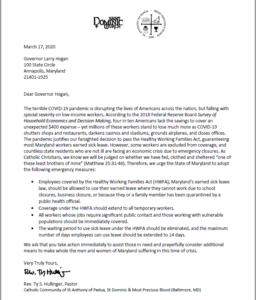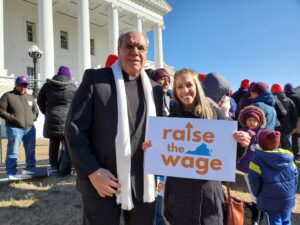A recent article in Commonweal — “The Orthodox Church & Social Teaching” — just alerted me to a new social teaching document issued by the Greek Orthodox Church in America with the approval of Patriarch Bartholomew I of Constantinople himself. FOR THE LIFE OF THE WORLD: Toward a Social Ethos of the Orthodox Church is heavy on economic justice, among other themes. See, for example, paragraph 37:
Against all such practices, the Orthodox Church will insist upon the high dignity of labor and upon the inviolable sanctity of each person, and that “The laborer is worthy of his hire” (1 Timothy 5:18). Moreover, no one should labor without respite: the Church insists that a just economy or business is one that insures not only the reasonable productivity and respectable pay of workers, but their opportunities for sufficient rest from work, for recreation, and for restoration of body and soul with their families, friends, and communities. It must require of every society with the means to do so that it protect its workers—both documented and undocumented—against abuse, humiliation, neglect, and cynical exploitation. It must ask of governments that they pass laws that make it possible for employers to provide jobs but not to treat labor as a mere commodity or business expense without any special moral status. Every advanced economy must, if it would be just, make it a matter of law and custom that those businesses that enjoy incorporation in nations that provide trustworthy legal systems, functioning financial institutions, and basic civil freedoms must be willing, as part of their social compact with those nations, to comply with laws and practices that provide workers with humane conditions and living wages, and that forbid complicity in corrupt systems of structural poverty in other nations. This entails laws that ensure that, even in establishing facilities in the developing world, such businesses must be held to the same standards of conduct toward labor that obtain in the developed world; and the ability of businesses to manufacture, market, and trade goods, or otherwise to participate in the global market, must be made contingent upon just labor practices. The Church must also call for laws that do not subject undocumented workers to the terror of legal penalty when seeking redress for abuses on the part of their employers. At the same time, the Church should encourage corporations to invest humanely in depressed parts of the world, and to try to provide opportunities where none previously existed; it asks only that such businesses must be held to standards of conduct that respect the inherent dignity of every human person, and that they make their investments in developing economies in order to improve the conditions of the poor rather than to profit from their poverty.
I would have thought this would be a natural place to note the role of labor unions, but of course, not everyone thinks like me. However, paragraph 63 notes the right to organize in the context of inalienable civil rights of the human person:
Then there are those civil rights that must be regarded as the universal and inalienable possessions of all persons: the right to vote for or against those exercising political power, equal access for all persons to political representation, freedom of association, freedom of religion, the right of peaceful assembly and protest, freedom of workers to form unions…
This language in my mind recalls Gaudium et Spes, whose paragraph 68 observes:
Among the basic rights of the human person is to be numbered the right of freely founding unions for working people. These should be able truly to represent them and to contribute to the organizing of economic life in the right way. Included is the right of freely taking part in the activity of these unions without risk of reprisal.
It’s beautiful to see our brothers and sisters in the Orthodox communion reaffirming their commitment to economic justice and the right to organize in a period when both are under threat in secular history!


